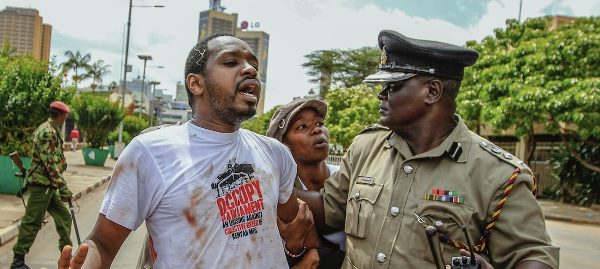

Early in this riveting documentary, Kenyan activist Boniface Mwangi leads a stunt involving painting pigs with red paint and letting them loose outside in front of Parliament. The act is intended to protest the corruption of Kenya’s sitting president, Uhuru Kenyatta, and other officials. It doesn’t take long before Mwangi and those with him are confronted by police, who use forceful measures to disperse the crowd.
It won’t be the last time a violent encounter occurs between protesters and law enforcement, and each time director Sam Soko captures the ensuing chaos with disorienting, in-your-face camerawork. Yet despite how chaotic and terrifying these events are, Mwangi is undeterred in trying to reform a broken political system. Much of what is wrong, he argues, has been inherited from the days of British rule, when colonialists purposefully played favorites among indigenous tribes to foster divisions, which, in turn, made the Kenyans easier to control.
Decades after Kenya’s independence, a common practice among politicians has been fanning those enduring tribal resentments through incendiary rhetoric, which as recently as 2007 led to mass violence and reportedly more than 1,400 dead. Initially, Soko delves into how the murders had a profound influence on Mwangi’s life, but then the film changes gears, following its subject as he launches a bid for regional office in an election 15 months away. He’s running in the opposite manner of typical candidates, appealing to all voters no matter which tribe they belong to. Possibly even more radically, Mwangi won’t campaign using ostentatious displays of wealth, unlike some of the other men in the running, including a vapid pop singer.
Some of the most fascinating scenes involve Mwangi venturing into crowded marketplaces, where most of the potential voters he encounters directly ask him for money. When he responds that he doesn’t have any but promises to work on their behalf once elected, they scoff or ignore him. Yet the film doesn’t capture these moments to ridicule or shame those behaving in such mercenary fashion. On the contrary, it wants to understand why. The answer, Mwangi’s campaign manager hypothesizes, is Kenyans have become inured to politicians who promise the moon and then fail to deliver once they get into office, and so in response, they preemptively try to get what they can out of them.
As for why Kenyans would put up with this broken system at all, there is a telling scene in which Mwangi brings his wife and children to see the extremely cramped one-room apartment where he lived as a boy. Here he explains how growing up poor makes one afraid to speak out or stand up for oneself. Given how awash in poverty the country is, the message emerges that change will not happen until someone, despite coming from humble means, nevertheless rises up. Mwangi, however, isn’t rising up all by himself, and it’s genuinely rousing to see his small, underfunded, yet passionate team of volunteers generate real buzz. They leverage social media to build a base of grassroots support. At times, they use guerrilla-style tactics, such as hiring graffiti artists when they don’t have time to get posters printed.
But Softie isn’t just a chronicle of a political campaign. The film spends considerable time with Mwangi’s wife, Njeri, who struggles emotionally to support her husband during his long, at times quixotic quest. From the start, the lines of communication between the couple don’t always appear so open, and the tension only gets worse. Yet we can sympathize with both. We understand Mwangi’s desire to shape the country into a better place for his children. On the other hand, Njeri’s primary concern is for the welfare of her family, which is increasingly in jeopardy as the establishment begins taking her husband more seriously.
Overall, this film works on multiple levels: as an insider’s look at a political campaign, an underdog story, a domestic drama, and even something of a thriller toward the end. It may take place an ocean apart from Western shores, but it’s especially relevant to viewers as a cautionary tale of what results when tribalism overtakes national identity, and when leaders willfully manipulate those tribal ties for their benefit.
SOFTIE Trailer from Icarus Films on Vimeo.
















Leave A Comment